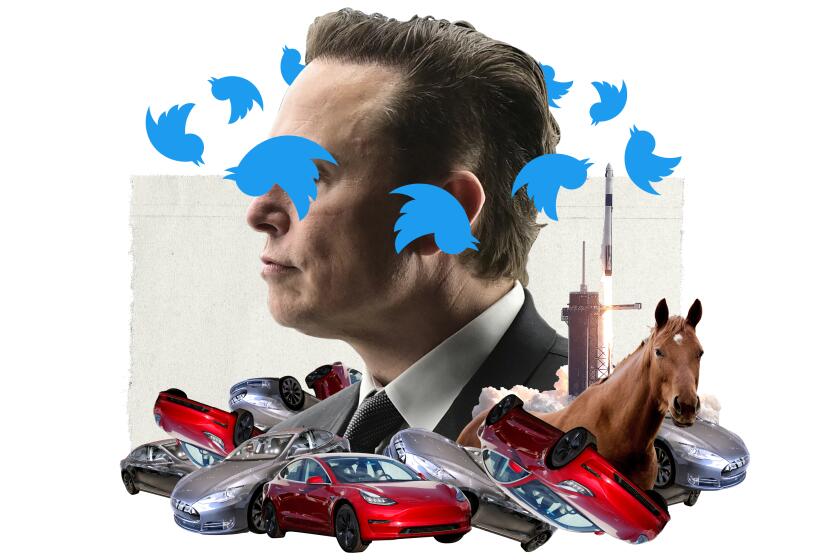Elon Musk delivers first Tesla Cybertrucks, calling them ‘the most unique thing on the road’

- Share via
Four years after Elon Musk unveiled it with billowing clouds of smoke, balls of fire and a botched demonstration of its shatter-resistant windows, Tesla has finally made the first deliveries of its alien-punk Cybertruck.
Standing in the bed of the stainless-steel-clad electric pickup, which has been mired by production delays and skepticism about its design and everyday utility, Musk called the Cybertruck “the most unique thing on the road” but promised that it is “actually very useful.”
“It’s not just some grandstanding showpiece like me,” he said during Thursday’s delivery event, which was livestreamed on X, formerly Twitter.
With the launch, Tesla has entered an extremely competitive truck market dominated by Ford’s F-Series, a dependable workhorse that has been the country’s top-selling truck for 46 years in a row and the top-selling vehicle for 41 years.
Musk has sought to set his rugged pickup far apart from rivals, starting with a radically angular, polarizing look and much-hyped features such as bulletproof and arrowproof doors and “armor glass” windows.
Such “apocalypse technology,” as Musk referred to it, has led some analysts to question whether the truck — which starts at $60,990 — could ever achieve mainstream success the way Tesla’s Model 3 and Model Y have.
Elon Musk’s track record as a boss is an endless scroll of impulse firings, retribution, tone-deafness on race — and the impregnation of a subordinate.
The Cybertruck, which Musk boasted has the handling and speed of a sports car, has towing capacity of 11,000 pounds, a maximum payload of 2,500 pounds and a 340-mile estimated range.
“We have a car here that experts said was impossible, that experts said would never be made,” Musk said. “Finally, the future will look like the future.”
During the half-hour presentation, Tesla redid its infamous window stunt from the Cybertruck’s debut four years ago, when lead designer Franz von Holzhausen hurled a steel ball at the truck’s front window to demonstrate its durability. It shattered, as did the back window during a second attempt.
This time around, the window stayed intact, although it appeared the steel ball had been swapped out for a baseball.
Deliveries of the Cybertruck were initially estimated to begin in late 2021. Its lengthy delay means Tesla is now playing catch-up.
When Tesla’s chief executive first introduced the Cybertruck at an event in Hawthorne, there were no all-electric pickup trucks being shipped to customers. Today there are a handful, with several more models by big automakers and electric startups on the way.
In late 2021, Rivian became the first automaker to bring a fully electric pickup to the consumer market with its R1T, ahead of Ford’s F-150 Lightning, which was released in spring 2022.
Despite getting its first Cybertrucks on the road, Tesla will continue to face major challenges manufacturing the vehicle in large volumes and is unlikely to be able to produce 250,000 a year until 2025, Musk has said.
Tesla hasn’t disclosed how many people paid $100 deposits to get on the waiting list, but Musk said last year that the Austin, Texas, carmaker had “more orders of the first Cybertrucks than we could possibly fulfill for three years after the start of production.”
“The ramp of production for Cybertruck will be difficult,” Wedbush analyst Daniel Ives said in an investor note after Thursday’s event. “Musk and Co. are not expecting to be cash-flow positive from this vehicle for another 12 to 18 months (could be longer in our view).”
Still, launching the truck “is important for the broader Tesla growth story over the coming years and also will prove to the doubters that Musk can successfully expand the Tesla halo effect as more consumers head down the EV path.”
Thursday’s Cybertruck event came a day after Musk, who has been facing accusations of antisemitism, appeared at the New York Times’ DealBook Summit conference.
During an onstage interview, he apologized for a tweet he made this month that appeared to publicly endorse a notorious antisemitic conspiracy theory.
“I am quite sorry,” he said. “I should in retrospect not have replied to that particular post.”
But he was less contrite when asked about the ensuing pullback by advertisers, including Disney, Apple, IBM and Lionsgate Entertainment.
“Don’t advertise,” he said to the advertisers who have fled social media platform X, which he owns.
“If somebody’s going to try to blackmail me with advertising, blackmail me with money?” he continued. “Go f—yourself. Is that clear?”
More to Read
Inside the business of entertainment
The Wide Shot brings you news, analysis and insights on everything from streaming wars to production — and what it all means for the future.
You may occasionally receive promotional content from the Los Angeles Times.












